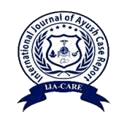Panchakarma-Based Detoxification Procedures Can Regulate the Hepato-renal Dysfunction: A Case Study
Abstract
A 33 years male patient came for consultation for left arm pain for one month with a report of hepato-renal dysfunction. He had a history of smoking tobacco and taking alcohol for a long time. The patient was accompanied by considerable work pressure and stress for one year. The patient was initially diagnosed with Visvachi (cervical spondylitis) as the cervical spine was found normal, and the pain was unilateral. The diagnosis was confirmed as Mamsa gata vata (Myofascial pain). It was thought that smoking, alcohol, and might produce Reactive Oxygen Species (ROS), which dysregulate the hepato-renal function. The Panchakarma procedure also reduces lipid peroxidase levels, reduces ROS formation, and increases the dismutase level. It also modulates metabolic expression and biological transformation. Therefore Panchakarma intervention was planned for this patient to reduce myofascial pain and purify the body in toto. Panchakarma is a complex multi-disciplinary approach stated from Deepana , Pachana followed by Abhyanga(Oil m, and Swedana(sweating). The Matra vasti (medicated enema) was planned for this case followed by Samsarjana karma diet therapy). There was a significant change bet total scores before and after panchakarma therapy of Fibromyalgia Impact Questionnaire (FIQ) score, HAD (Hospital Anxiety and depression score), and pain score. The abnormal liver enzymes and renal function tests were normalized after panchakarma treatment. Panchakarma therapy can treat fibromyalgia with better pain management and quality of life outcomes. It can detoxify the body by regulating hepato-renal dysfunction. More clinical evidence for panchakarma regulating liver and other metabolic enzymes and lipid homeostasis is required.

This work is licensed under a Creative Commons Attribution-NonCommercial-NoDerivatives 4.0 International License.

